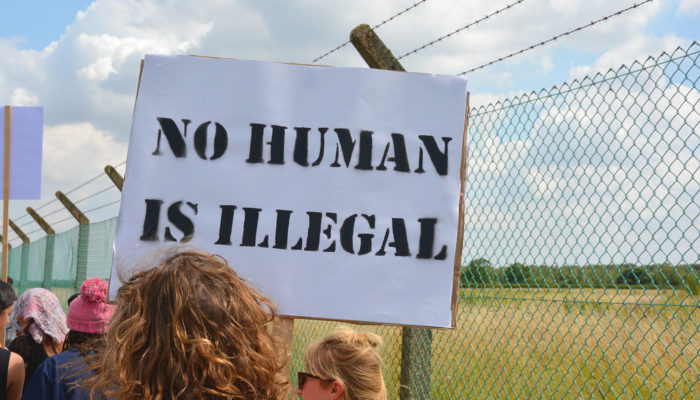The (Real) Truth about Asylum: a UK Perspective
There are many myths surrounding the asylum process, and the people who go through it.
One of the first, and often most troubling, is that asylum-seekers who are have entered a country looking for safety – like the UK– are somehow automatically classed as ‘illegal’ as a result.
British news reports describe such “illegals” hiding in trucks, or cramming into dinghies to cross the Channel, as though by making the journey they have somehow forgone their right to refuge.
But the reality is that asylum-seekers must find a way into the UK before they can even be considered for an asylum claim. There’s no option within global asylum law for those who want to claim refuge from their home country; they must be at a UK port, having physically fled their homes, in order to be eligible.
So, when Boris Johnson, Priti Patel, or Sajid Javid describe their plans to curb channel-crossing, which is a route more and more of the people fleeing from their home countries are choosing to take, they are being deliberately inflammatory. There is nothing illegal about crossing the channel to make an asylum claim, just as there is nothing illegal about entering the country through any other means to make one. In fact, it is essential. For this reason, many asylum seekers find themselves in a catch-22 in terms of the prejudice they face from the public, press, and political spheres; to make a legitimate and legal claim for refuge they must first find a way to get into the country, but once they have found this way they will be dubbed as “illegal” by every direction.
Another common misunderstanding within developed countries like the UK, is that an asylum-seeker makes a choice when claiming refuge there. Some suggest that, because of factors like Britain’s economy, healthcare system, and welfare state, many people try and effectively ‘cheat the system’ by making a false claim.
If the asylum process is considered in any detail however, this idea is not feasible. For a start, those seeking refuge risk their lives and the lives of their children in order to reach the UK. Many drown in the channel; many freeze in the back of lorries; many are killed or abused by smugglers who take advantage of their desperation. The likelihood of any person choosing this option on a whim is miniscule. In fact, the fact a person would be willing to subject themselves and/or their family to such a perilous journey in the first place is an indicator of how unliveable and dangerous their lives in their home countries have become.
Aside from the journey, the chances of being granted asylum in the UK are already low – even for so-called ‘genuine’ asylum-seekers. Less than half of claims are granted by the Home Office, and most have to go to a court appeal in front of a judge before they are granted (another indicator of how strict the Home Office is). This process can take months, or years, and all the while an asylum seeker has no right to work, study, or claim any kind of benefit other than the very basic asylum support they receive (which amounts to approximately £37.75 a week).
In fact, the financial burden associated with asylum-seekers is another topic which is often highly inflated, with claims about asylum-seekers either taking benefits, or taking Briton’s jobs as rife as ever in much of the media and public opinion. The truth, however, is that asylum seekers are not allowed to work in any role whatsoever for the first 12 months of their claim. After this, they are eligible to work in one of a select few jobs, which are classed as officially ‘in shortage’ in the UK (meaning Brits can’t fill them). These are all highly-skilled roles, like engineers, surgeons, and trained ballet dancers – and it is quite unlikely that an asylum-seeker would be able to take on such a role, considering many of them have fled from developing and/or war-torn countries.
Rather than being a choice, as many people mistakenly believe, seeking asylum is a human right, outlined by international laws. According to the 1951 Refugee Convention, which governs the world’s Asylum laws, every human being has a right to refuge in another country, if they are being persecuted and fear their safety or life. Not allowing a person to extend that right without discrimination or prejudice, is a violation of this right.
What many people seem to forget is that asylum seekers and refugees are human beings. They are people, like you or me, whose lives at one point or another became unliveable. The biggest myth then, is one that perpetuates the belief that this is not the case, and encourages the asylum seeking community to be treated in any other way.
As part of a campaign to help dispel common myths and misunderstandings about people seeking asylum and refugees in the UK the Immigration Advice Service and its partners have launched a new collaborative media platform: Immigration News. We’ve also created an Inforgraphic offering 15 Facts about Asylum Seekers and Refugees.
